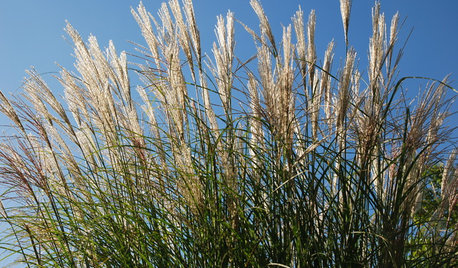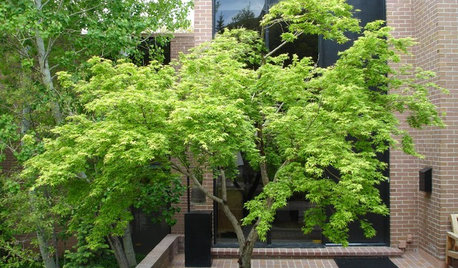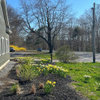Horticultural oil not working on aphids
Heruga (7a Northern NJ)
2 years ago
Featured Answer
Sort by:Oldest
Comments (13)
peren.all Zone 5a Ontario Canada
2 years agolast modified: 2 years agogetgoing100_7b_nj
2 years agoRelated Discussions
Summer/Horticulture Dormant Oils all Summer Long on Apple Tree's
Comments (3)Where are you located? Some insects that bother fruit trees are regional. Hort oil is not an answer for most insects that attack apple trees. You should also check your local extension services at least to find out what kinds of bugs you need to deal with. Believe everyone would love to grow organically if they can....See MoreHorticultural/insecticide oils
Comments (11)The bottle states it can be used in greenhouses as well as outdoor/indoor plants. The main ingredient is mineral oil. Trust me, I'm very cautious with products as I have a child and 2 dogs in the house. My husband also works for Bayer in the Environmental Science division (I used too as well, that's how we met - more info than needed, lol) and knows about all the Bayer Advanced items. He looked at the stuff and while it only states mineral oil and nothing else, he said just make sure not to touch it until it dries. He said oil is used to smother/suffocate pests. He's always skeptical of organic products as to their efficacy. I always wear gloves when working with all my plants (my citrus trees make me itchy). I'll just make sure to spray this stuff when I'm the only one home. Not sure if this stuff even works although I did buy it at a nursery store. Thanks for the concern as it made me look at the label a lot closer. it does make the leaves look nice :-)...See MoreCitrus leaf miner. Will horticultural oil help?
Comments (9)Systemics are not for me. I have no desire to eat citrus that has been treated with them. Here in Calif. all citrus sold at nurseries is now required to be treated systemically for the citrus greening carrying(maybe?) bug. If you read up on it, you'll see that imidacloprid can be found in flowers, fruit, pollen, and nectar two years after application. There was one plant (I forget which kind) where it was detected 6 years later. It's toxic to bees and pollinating insects, and who know...humans too? I've spent many hours, usually at night, turning over small young citrus leaves looking for the mines and the shiny surface that create, and carefully squeezing the larva. It takes a light touch since the leave are usually very young and delicate, but it's doable and kind of satisfying. Especially if you only have one tree. Season55, the time to start looking for them is springtime when your tree is flushing. They usually only lay the eggs on leaves that aren't hardened. I'm not sure how long it takes a new citrus leaf to harden, but I'm guessing around 3 weeks. I find it's easier to spot the beginning tunnels at night with a flashlight, but that's just me. The moths tend to lay on the underside of the young leaves, near the center vein, often near the base of the leaf. The larva will mine the leaf for some time, I believe it's weeks, and end up at the edge of the leaf. It goes through a number of instar stages(3) then a pupa stage where it rolls the edge of the leaf over itself for protection. So if you spot a young leaf with it's edge rolled over, that's your last change to squish the CLM. I also tested the ISCAlure citrus leaf miner traps which are now available on Amazon at what seems to be a reasonable price. I'll be ordering a set next spring around May when the moths come out of hiding. My testing time was inconclusive, the traps do catch some of the males but they aren't considered a cure-all. But I think if you get out early with the traps, while the infestation is small or just before it is starting, along with something like Neem oil or Ultrafine oil, you might be able to stop them, if you don't have too many trees to worry about They don't attack every citrus tree I have, and most of mine are smallish and in containers....See MoreFirst time spraying horticultural oils - help me out :)
Comments (40)I thought I would give a little update and share my experience for those like me who are new to horticultural oil and defoliating. I defoliated all my roses on Jan 13ish and now, about 6 weeks later, the roses are all leafing out nicely. Some even have buds. None of my old garden roses have buds yet, but that's probabaly because they were all brand new babies. Here's some that do have buds now, 6 weeks later... Don Juan Barbra Streisand The weaker solution of oil didn't seem to damage anything, but when I mixed and sprayed the stronger "dormant" oil solution, some of the roses didn't seem to like it. No real damage, but some canes have a little tan, or maybe even a little sunburn. Even though I was trying to be careful, some of my newer bands got oil on them. The weaker "summer" solution didn't seem to bother them, but they didn't like it when they got some of the stronger "dormant" solution on them. Again, no catastrophic damage, but just not happy, killed some of their new growth, and they are a little set back. I'm going to imagine that it only got rid of the weaker growth, allowing for a stronger plant in the long run, so I don't feel guilty. ;) All in all, I think I will stick with the weaker "summer" solution in the future if I have little bands or other sensitive plants nearby where I'm spraying. That's about it for the update! :)...See MoreHeruga (7a Northern NJ)
2 years agocecily 7A
2 years agogardengal48 (PNW Z8/9)
2 years agoHeruga (7a Northern NJ)
2 years agoSeniorBalloon
2 years agocharles kidder
2 years agoSeniorBalloon
2 years agoNHBabs z4b-5a NH
last yearSeniorBalloon
last yearrusty_blackhaw
last yearlast modified: last year
Related Stories

FALL GARDENING5 Ways to Put Fall Leaves to Work in Your Garden
Improve your soil and yard the organic way with a valuable garden booster that grows on trees
Full Story
CLEANINGHow to Clean and Care for Garden Tools
Keep your gardening gear in top shape with these maintenance and storage tips from a horticultural expert
Full Story
LIFEConsider Avoiding These Plants to Help Keep Your Garden Fire-Safe
Plants that accumulate dead material, are high in oil or have low moisture content in leaves put some homes at risk
Full Story
GARDENING FOR BUTTERFLIESGardening for the Bees, and Why It’s a Good Thing
When you discover how hard bees work for our food supply, you may never garden without them in mind again
Full Story
ROCKY MOUNTAINS GARDENINGRocky Mountain Gardener's February Checklist
Get smart with your seeds, strike with oil to manage pests and practice proficient pruning — your trees and shrubs will thank you
Full Story0

KITCHEN CABINETSHow to Design a Kitchen With Green Cabinets
See how these 9 countertop, hardware, backsplash and flooring combinations work with green cabinets
Full Story
HISTORIC HOMESBeatrix Potter: A Place of Her Own
See the farm that inspired the beloved author to cultivate an independent life and write some of her most famous works
Full Story
EARTH DAYThe Case for Losing the Traditional Lawn
Work less, help the environment and foster connections by just saying no to typical turf
Full Story
KITCHEN DESIGNKitchen Sinks: Soapstone for Germ-Free Beauty and Durability
Stains and bacteria? Not on soapstone's watch. But this sink material's benefits don't come cheap.
Full Story
FARMHOUSESHouzz Tour: German Tradition Deep in the Heart of Texas
Rooted in architecture from the 1800s, this award-winning home mixes history with the vernacular of today
Full Story



gardengal48 (PNW Z8/9)